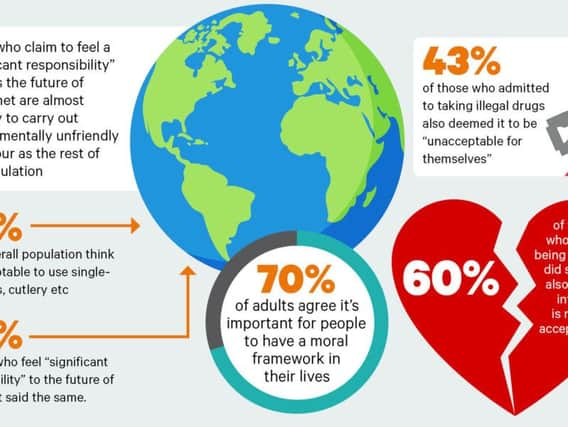Britons fail to live up to personal moral codes


Meanwhile, despite most people having a strong sense of right and wrong, behaviour does not always live up to intentions.
Actions that people may deem “acceptable for others” may be considered by people as “unacceptable for themselves” – such as watching porn, taking illegal drugs and paying for sex.
Advertisement
Hide AdAdvertisement
Hide AdWhile 70 per cent of adults agree it is important for people to have a moral framework in their lives, they do not always follow their strongly held beliefs.
The report found that those who claim to feel a “significant responsibility” towards the future of the planet are almost as likely to carry out environmentally unfriendly behaviour as others who don’t. Almost two-thirds of the population think it is acceptable to use single-use plates, cutlery etc and 62 per cent of those who feel “significant responsibility” to the future of the planet said the same.
Three in five adults who say they have been unfaithful to their partner also say it is never acceptable to cheat, while 43 per cent of those who admitted to taking illegal drugs also deemed it to be “unacceptable for themselves”.
The survey found that almost half of people would take a sick day at work because they felt they needed a break, rather than that they were genuinely ill.
The nationwide survey of 3,655 adults aged over 16 was conducted by ComRes as part of the BBC’s Year of Beliefs. Respondents were asked to answer questions on their values and morals and their attitudes to a range of issues including relationships, work, the environment, consumer ethics and life and death.
Alison Kirkham, controller of factual commissioning at the BBC, said: “The BBC’s Year of Beliefs has explored and celebrated the multiple expressions of faith and belief in modern Britain and has examined a complex range of ethical issues affecting people’s lives.
“The findings of the morality survey are an important part of this, providing a snapshot of our ethics and values.
She added: “This survey gives a revealing insight into how different generations view hotly debated topics such as the environment, relationships and the online world.”
Overall, the majority of adults in the UK believe in tolerance, with 69 per cent of those surveyed saying people should be free to live their lives as they want, as long as that does not harm others.